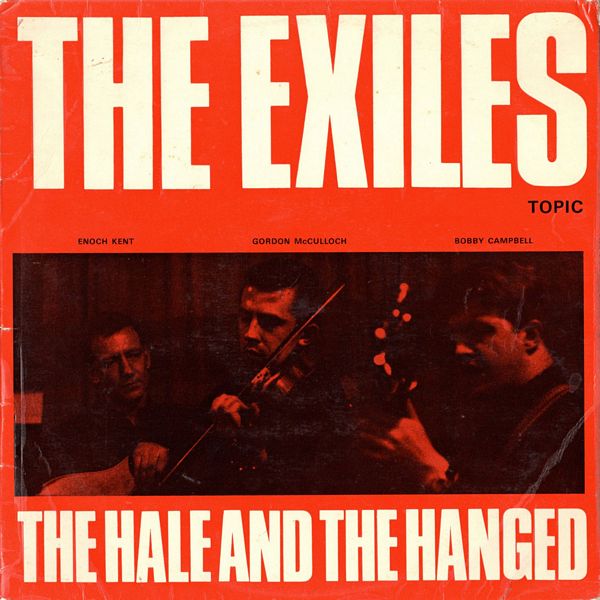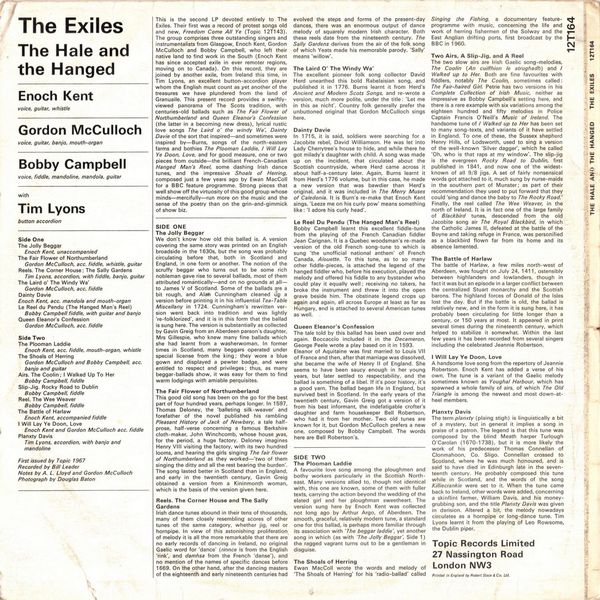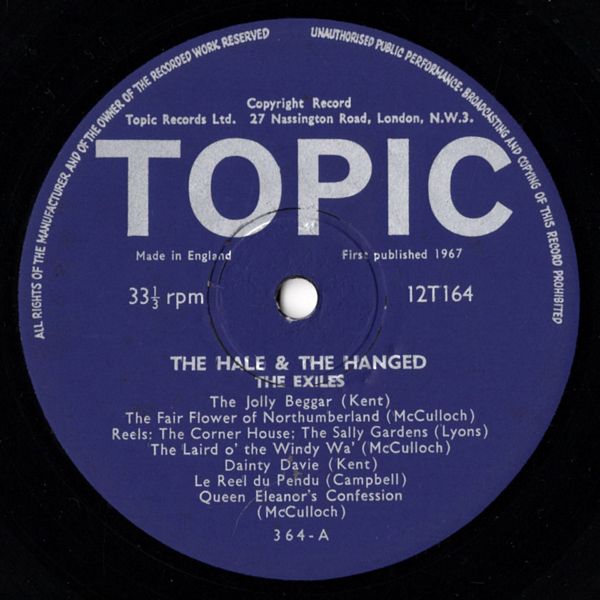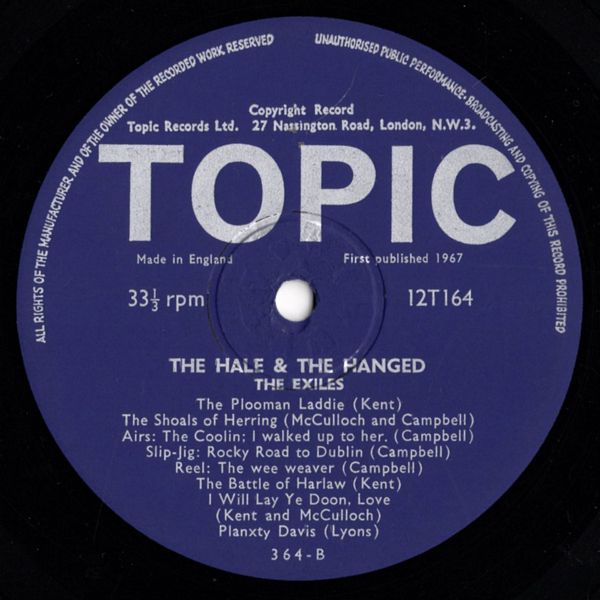
 |



|
Sleeve Notes
This the second LP devoted entirely to The Exiles. Their first was a record of protest songs old and new, Freedom Come All Ye (Topic 12T143). The group comprises three outstanding singers and instrumentalists from Glasgow, Enoch Kent Gordon McCulloch and Bobby Campbell, who left their native land to find work in the South (Enoch Kent has since accepted exile in ever remoter regions, moving on to Canada). On this record, they are joined by another exile, from Ireland this time, in Tim Lyons, an excellent button-accordion player whom the English must count as,yet another of the treasures we have plundered from the land of Granuaile.
This present record provides a swiftly-viewed panorama of The Scots tradition, with centuries-old ballads such as The Fair Flower of Northumberland and Queen Eleanor's Confession (the latter in a becoming new dress), lyrical rustic love songs The Laird o' the windy Wa', Dainty Davie of the sort that inspired — and sometimes were inspired by — Burns, songs of the north-eastern farms and bothies The Plooman Laddie, I Will Lay Ye Doon, Love, and for good measure, one or two pieces from outside — the brilliant French-Canadian Hanged Man's Reel, some dashing Irish dance tunes, and the impressive Shoals of Herring, composed just a few years ago by Ewan MacColl for a BBC feature programme. Strong pieces that well show off the virtuosity of this good group whose minds — mercifully — run more on the music and the sense of the poetry than on the grin-and-gimmick of show biz
The Jolly Beggar — We don't know how old this ballad is. A version covering the same story was printed on an English broadside in the 1630s, but the song was probably circulating before that, both in Scotland and England, in one form or another. The notion of the scruffy beggar who turns out to be some rich nobleman gave rise to several ballads, most of them attributed romantically — and on no grounds at all — to James V of Scotland. Some of the ballads are a bit rough, and Alan Cunningham cleaned up a version before printing it in his influential Tea-Table Miscellany in 1724. Cunningham's rewritten version went back into tradition and was lightly 're-folklorized', and it is in this form that the ballad is sung here. The version is substantially as collected by Gavin Greig from an Aberdeen parson's daughter, Mrs. Gillespie, who knew many fine ballads which she had learnt from a washerwoman. In former times in Scotland, many beggars operated under special license from the king; they wore a blue gown and displayed a pewter badge, and were entitled to respect and privileges; thus, as many beggar-ballads show, it was easy for them to find warm lodgings with amiable perquisites.
The Fair Flower of Northumberland — This good old song has been on the go for the best part of four hundred years, perhaps longer. In 1597, Thomas Deloney, the 'balleting silk-weaver' and forefather of the novel published his rambling Pleasant History of Jack of Newbery, a tale half prose, half-verse concerning a famous Berkshire cloth-maker, John Winchcomb, whose house was, for the period, a huge factory. Deloney imagines Henry VIII visiting the factory, with its two hundred looms, and hearing the girls singing The fair flower of Northumberland as they worked — 'two of them singing the ditty and all the rest bearing the burden'. The song lasted better in Scotland than in England, and early in the twentieth century, Gavin Greig obtained a version from a Kininmonth woman, which is the basis of the version given here.
Reels: The Corner House and The Sally Gardens — Irish dance tunes abound in their tens of thousands, many of them closely resembling scores of other tunes of the same category, whether jig, reel or hornpipe. In view of this astonishing proliferation of melody it is all the more remarkable that there are no early records of dancing in Ireland, no original Gaelic word for 'dance' (rinnce is from the English 'rink', and damhsa from the French 'danse'), and no mention of the names of specific dances before 1669. On the other hand, after the dancing masters of the eighteenth and early nineteenth centuries had evolved the steps and forms of the present-day dances, there was an enormous output of dance melody of squarely modern Irish character. Both these reels date from the nineteenth century. The Sally Gardens derives from the air of the folk song of which Yeats made his memorable parody. 'Sally' means 'willow'.
The Laird O' The Windy Wa' — The excellent pioneer folk song collector David Herd unearthed this bold Rabelaisian song, and published it in 1776. Burns learnt it from Herd's Ancient and Modern Scots Songs, and re-wrote a version, much more polite, under the title: 'Let me in this ae nicht'. Country folk generally prefer the unbuttoned original that Gordon McCulloch sings here.
Dainty Davie — In 1715, it is said, soldiers were searching for a Jacobite rebel, David Williamson. He was let into Lady Cherrytree's house to hide, and while there he got milady's daughter with child. A song was made up on the incident, that circulated about the Scottish countryside, where Herd came across it about half-a-century later. Again, Burns learnt it from Herd's 1776 volume, but in this case, he made a new version that was bawdier than Herd's original, and it was included in The Merry Muses of Caledonia. It is Burn's re-make that Enoch Kent sings. 'Leeze me on his curly pow' means something like: 'I adore his curly head'.
Le Reel Du Pendu (The Hanged Man's Reel) — Bobby Campbell learnt this excellent fiddle-tune from the playing of the French Canadian fiddler Jean Carignan. It is a Quebec woodsman's re-made version of the old French song-tune to which is sung 'the unofficial national anthem' of French Canada, Alouette. To this tune, as to so many other fiddle-pieces, is attached the legend of the hanged fiddler who, before his execution, played the melody and offered his fiddle to any bystander who could play it equally well; receiving no takers, he broke the instrument and threw it into the open grave beside him. The obstinate legend crops up again and again, all across Europe at least as far as Hungary, and is attached to several American tunes as well.
Queen Eleanor's Confession — The tale told by this ballad has been used over and again. Boccaccio included it in the Decameron, George Peele wrote a play based on it in 1593. Eleanor of Aquitaine was first married to Louis VII of France and then, after that marriage was dissolved, she became the wife of Henry II of England. She seems to have been saucy enough in her young years, but later settled to respectability, and the ballad is something of a libel. If it's poor history, it's a good yarn. The ballad began life in England, but survived best in Scotland. In the early years of the twentieth century, Gavin Greig got a version of it from his best informant, the indefatigable crofter's daughter and farm housekeeper Bell Robertson, who had it from her mother. Two old tunes are known for it, but Gordon McCulloch prefers a new one, composed by Bobby Campbell. The words here are Bell Robertson's.
The Plooman Laddie — A favourite love song among the ploughmen and bothy workers particularly in the Scottish Northeast. Many versions allied to, though not identical with, this one are known, some of them with fuller texts, carrying the action beyond the wedding of the elated girl and her ploughman sweetheart. The version sung here by Enoch Kent was collected not long ago by Arthur Argo, of Aberdeen. The smooth, graceful, relatively modern tune, a standard one for this ballad, is perhaps more familiar through its association with 'The beggar laddie', yet another song in which (as with 'The Jolly Beggar', Side 1) the ragged vagrant turns out to be a gentleman in disguise.
The Shoals of Herring — Ewan MacColl wrote the words and melody of The Shoals of Herring' for his 'radio-ballad' called Singing the Fishing, a documentary feature-programme with music, concerning the life and work of herring fishermen of the Solway and the East Anglian drifting ports, first broadcast by the BBC in 1960.
Two Airs, A Slip-Jig, and A Reel — The two slow airs are Irish Gaelic song-melodies, The Coolin (An cuilfhion le atrughadh) and I Walked up to Her. Both are fine favourites with fiddlers, notably The Coolin, sometimes called: The Fair-haired Girl. Petrie has two versions in his Complete Collection of Irish Music, neither as impressive as Bobby Campbell's setting here, and there is a rare example with six variations among the eighteen hundred and fifty melodies in Police Captain Francis O'Neill's Music of Ireland. The handsome tune of I Walked up to Her has been set to many song-texts, and variants of it have settled in England. To one of these, the Sussex shepherd Henry Hills, of Lodsworth, used to sing a version of the well-known 'Silver dagger', which he called 'Oh, who is that raps at my window'. The slip-jig is the evergreen Rocky Road to Dublin, first published in 1841, and now one of the widest-known of all 9/8 jigs. A set of fairly nonsensical words got attached to it, much sung by nurse-maids in the southern part of Munster; as part of their recommendation they used to put forward that they could 'sing and dance the baby to The Rocky Road Finally, the reel called The Wee Weaver, in the north of Ireland. It is in fact one of the large family of Blackbird tunes, descended from the old Jacobite song air The Royal Blackbird, in which the Catholic James II, defeated at the battle of the Boyne and taking refuge in France, was personified as a blackbird flown far from its home and its absence lamented.
The Battle of Harlaw — The battle of Harlaw, a few miles north-west of Aberdeen, was fought on July 24, 1411, ostensibly between highlanders and lowlanders, though in fact it was but an episode in a larger conflict between the centralized Stuart monarchy and the Scottish barons. The highland forces of Donald of the Isles lost the day. But if the battle is old, the ballad is relatively new, and in the form it is sung here, it has probably been circulating for little longer than a century, or 150 years at most. It appeared in print several times during the nineteenth century, which helped to stabilize it somewhat. Within the last few years it has been recorded from several singers including the celebrated Jeannie Robertson.
I Will Lay Ye Doon, Love — A handsome love song from the repertory of Jeannie Robertson. Enoch Kent has added a verse of his own. The tune is a variant of the Gaelic melody sometimes known as Youghal Harbour, which has spawned a whole family of airs, of which The Old Triangle is among the newest and most down-at-heel members.
Planxty Davis — The term planxty (plaing stigh) is linguistically a bit of a mystery, but in general it implies a song in praise of a patron. The legend is that this tune was composed by the blind Meath harper Turlough O'Carolan (1670-1738), but it is more likely the work of his predecessor Thomas Connellan of Clonmahoon, Co. Sligo. Connellan crossed to Scotland, where he was much honoured, and is said to have died in Edinburgh late in the seventeenth century. He probably composed this tune while in Scotland, and the words of the song Killiecrankie were set to it. When the tune came back to Ireland, other words were added, concerning a skinflint farmer, William Davis, and his money-grubbing son, and the title Planxty Davis was given in derision. Altered a bit, the melody nowadays circulates as a hornpipe or long-dance tune. Tim Lyons learnt it from the playing of Leo Rowsome, the Dublin piper.